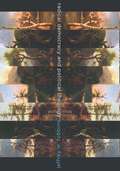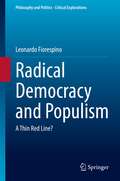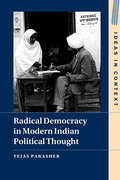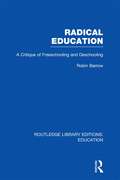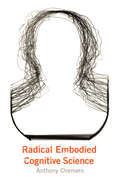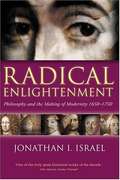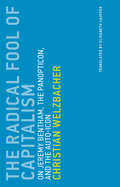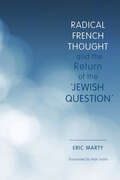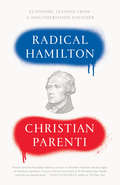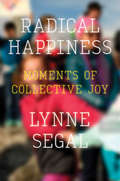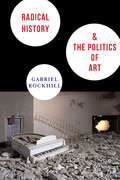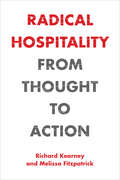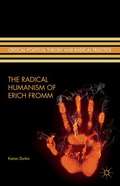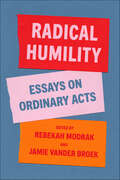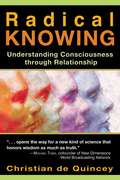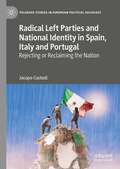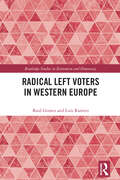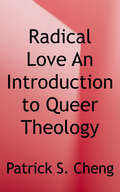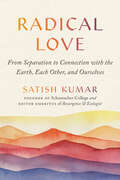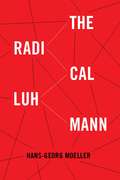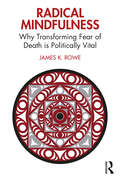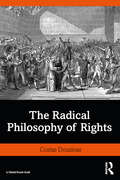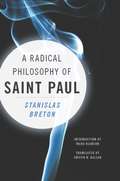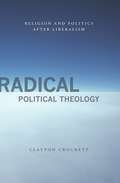- Table View
- List View
Radical Democracy and Political Theology (Insurrections: Critical Studies in Religion, Politics, and Culture)
by Jeffrey RobbinsAlexis de Tocqueville once wrote that "the people reign over the American political world like God over the universe," unwittingly casting democracy as the political instantiation of the death of God. According to Jeffrey W. Robbins, Tocqueville's assessment remains an apt observation of modern democratic power, which does not rest with a sovereign authority but operates as a diffuse social force. By linking radical democratic theory to a contemporary fascination with political theology, Robbins envisions the modern experience of democracy as a social, cultural, and political force transforming the nature of sovereign power and political authority.Robbins joins his work with Michael Hardt and Antonio Negri's radical conception of "network power," as well as Sheldon Wolin's notion of "fugitive democracy," to fashion a political theology that captures modern democracy's social and cultural torment. This approach has profound implications not only for the nature of contemporary religious belief and practice but also for the reconceptualization of the proper relationship between religion and politics. Challenging the modern, liberal, and secular assumption of a neutral public space, Robbins conceives of a postsecular politics for contemporary society that inextricably links religion to the political.While effectively recasting the tradition of radical theology as a political theology, this book also develops a comprehensive critique of the political theology bequeathed by Carl Schmitt. It marks an original and visionary achievement by the scholar the Journal of the American Academy of Religion hailed "one of the best commentators on religion and postmodernism."
Radical Democracy and Populism: A Thin Red Line? (Philosophy and Politics - Critical Explorations #18)
by Leonardo FiorespinoThis book offers an extensive comparative analysis of populism and radical democratic theories, tracing the line dividing the respective conceptions of ‘people’ and ‘popular sovereignty’. Whereas populism is often said to intertwine with democracy in some way, the contention of this book is that it significantly departs from democratic theory and practice, and belongs to a distinct conceptual space. It cannot be made to overlap, for instance, with “illiberal democracy”, the “democratic myth”, a crude electoral majoritarianism, nor can it amount to hiding undemocratic policies into properly democratic justifications. These positions, frequent as they are in the literature, are contested on the grounds of the dividing line identified, which starts unfolding at the level of the conception of ‘the people’ – i.e., of the sovereign – presupposed by populists and democrats. This book is of great interest to scholars involved in the study of democratic theory, contemporary challenges to democracy and the recent upsurge of populist discourse, as it helps better understand populism as a political phenomenon and more adequately defines it as a self-standing concept in political theory.
Radical Democracy in Modern Indian Political Thought (Ideas in Context #149)
by Tejas ParasherBetween the 1910s and the 1970s, an eclectic group of Indian thinkers, constitutional reformers, and political activists articulated a theory of robustly democratic, participatory popular sovereignty. Taking parliamentary government and the modern nation-state to be prone to corruption, these thinkers advocated for ambitious federalist projects of popular government as alternatives to liberal, representative democracy. Radical Democracy in Modern Indian Political Thought is the first study of this counter-tradition of democratic politics in South Asia. Examining well-known historical figures such as Dadabhai Naoroji, M. K. Gandhi, and M. N. Roy alongside long-neglected thinkers from the Indian socialist movement, Tejas Parasher illuminates the diversity of political futures imagined at the end of the British Empire in South Asia. This book reframes the history of twentieth-century anti-colonialism in novel terms – as a contest over the nature of modern political representation – and pushes readers to rethink accepted understandings of democracy today.
Radical Education: A Critique of Freeschooling and Deschooling (Routledge Library Editions: Education)
by Robin BarrowThis volume is a comprehensive critique of the radical tradition in educational theory. It traces the development of the key ideas in radical literature from Rousseau to the present day. Two opening chapters set Rousseau’s educational views and arguments in their political perspective, and subject them to an extended critical treatment. Subsequent chapters provide detailed analyses and examination of the ideas of A S Neill, Paul Goodman, Ivan Illich and Everett Reimer, Charles Weingartner and Neil Postman. Each author is treated separately but certain common themes and ideas are extracted and considered without reference to any particular author. Amongst others, the concepts of nature, learning, hidden curriculum and the relativity of knowledge are examined; at the same time broader arguments about the degree and nature of freedom that should be provided to children, deschooling and assessment are pursued.
Radical Embodied Cognitive Science
by Anthony ChemeroA proposal for a new way to do cognitive science argues that cognition should be described in terms of agent-environment dynamics rather than computation and representation.While philosophers of mind have been arguing over the status of mental representations in cognitive science, cognitive scientists have been quietly engaged in studying perception, action, and cognition without explaining them in terms of mental representation. In this book, Anthony Chemero describes this nonrepresentational approach (which he terms radical embodied cognitive science), puts it in historical and conceptual context, and applies it to traditional problems in the philosophy of mind. Radical embodied cognitive science is a direct descendant of the American naturalist psychology of William James and John Dewey, and follows them in viewing perception and cognition to be understandable only in terms of action in the environment. Chemero argues that cognition should be described in terms of agent-environment dynamics rather than in terms of computation and representation. After outlining this orientation to cognition, Chemero proposes a methodology: dynamical systems theory, which would explain things dynamically and without reference to representation. He also advances a background theory: Gibsonian ecological psychology, “shored up” and clarified. Chemero then looks at some traditional philosophical problems (reductionism, epistemological skepticism, metaphysical realism, consciousness) through the lens of radical embodied cognitive science and concludes that the comparative ease with which it resolves these problems, combined with its empirical promise, makes this approach to cognitive science a rewarding one. “Jerry Fodor is my favorite philosopher,” Chemero writes in his preface, adding, “I think that Jerry Fodor is wrong about nearly everything.” With this book, Chemero explains nonrepresentational, dynamical, ecological cognitive science as clearly and as rigorously as Jerry Fodor explained computational cognitive science in his classic work The Language of Thought.
Radical Enlightenment: Philosophy and the Making of Modernity 1650-1750
by Jonathan I. IsraelArguably the most decisive shift in the history of ideas in modern times was the complete demolition during the late seventeenth and eighteenth centuries - in the wake of the Scientific Revolution - of traditional structures of authority, scientific thought, and belief, by the new philosophyand the philosophies, culminating in Voltaire, Diderot, and Rousseau. In this revolutionary process which effectively overthrew all justification for monarchy, aristocracy, slavery, and ecclesiastical authority, as well as man's asendancy over woman and theology's domination over education andstudy, substituting the modern principles of equality, democracy, and universality, the Radical Enlightenment played a crucially important part. Despite the present-day interest in the revolutions of the late eighteenth century, the origins and rise of the Radical Enlightenment have beenastonishingly little studied, doubtless largely because if its very wide international sweep and the obvious difficulties of fitting it into the restrictive conventions of 'national history' which until recently tended to dominate all historiography. The greatest obstacle to the RadicalEnlightenment finding its proper place in modern historical writing is simply that it was not French, British, German, Italian, Jewish or Dutch, but all of these at the same time. In this novel interpretation of the Radical Enlightenment down to La Mettrie and Diderot, two of its key exponents,particular stress is placed on the pivotal role of Spinoza and the widespread underground international philosophical movement known before 1750 as Spinozism.
The Radical Fool of Capitalism: On Jeremy Bentham, the Panopticon, and the Auto-Icon (Untimely Meditations #10)
by Christian WelzbacherA fresh interpretation of Jeremy Bentham, finding that his “radical foolery” embodied a social ethics that was revolutionary for its time. Jeremy Bentham (1748–1832) is best remembered today as the founder of utilitarianism (a philosophy infamously abused by the Victorians) and the conceiver of the Panopticon, the circular prison house in which all prisoners could be seen by an unseen observer—later seized upon by Michel Foucault as the apotheosis of the neoliberal control society. In this volume in the Untimely Meditation series, Christian Welzbacher offers a new interpretation of Bentham, arguing that his “radical foolery” (paraphrasing Goethe's characterization of Bentham) actually embodied a social ethics that was new for its time and demands proper historical contextualization rather than retroactive analysis from the vantage point of late capitalism. Welzbacher provides just such an analysis, offering an account of the two great utilitarian projects that occupied Bentham all his life: the Panopticon and the Auto-Icon. Welzbacher rescues the Panopticon from the misapprehensions of Foucault, Orwell, and Lacan, arguing that Bentham saw the Panopticon as a pedagogical instrument incorporating the tenets of reason; construction and function, plan and influence, architecture and politics are brought into alignment. Bentham extolled the discovery in words that could easily be ascribed to Le Corbusier, Bruno Taut, or any other modernist architect. The Auto-Icon expressed Bentham's theories that the dead should benefit later generations; these theories were effectively sealed when Bentham decided to have his body preserved and put on display. (It can be seen today in a cabinet at University College London.) He also donated his inner organs to science—a practice outlawed at the time—and posthumously stage-managed his own ceremonial autopsy.Welzbacher reveals a Bentham who raised questions that feel familiar and current, invoking topoi that would come to define the modern era and that reverberate to this day.
Radical French Thought and the Return of the "Jewish Question" (Studies In Antisemitism Ser.)
by Bruno Chaouat Eric Marty Alan AstroFor English-speaking readers, this book serves as an introduction to an important French intellectual whose work, especially on the issues of antisemitism and anti-Zionism, runs counter to the hostility shown toward Jews by some representatives of contemporary critical theory. It presents for the first time in English five essays by Éric Marty, previously published in France, with a new preface by the author addressed to his American readers. The focus of these essays is the debate in France and elsewhere in Europe concerning the "Jew." The first essay on Jean Genet, one of postwar France's most important literary figures, investigates the nature of Genet's virulent antisemitism and hatred of Israel and its significance for an understanding of contemporary phenomena. The curious reappearance of St. Paul in theological and political discourse is discussed in another essay, which describes and analyses the interest that secular writers of the far left have shown in Paul's "universalism" placed over and against Jewish or Israeli particularism. The remaining essays are more polemical in nature and confront the anti-Israeli attacks by Alain Badiou and Gilles Deleuze.
Radical Hamilton: Economic Lessons from a Misunderstood Founder
by Christian ParentiA dramatic re-evaluation of the founding of the United States and the history of capitalism.In retelling the story of the radical Alexander Hamilton, Parenti rewrites the history early America and global economic history writ large. For much of the twentieth century, Hamilton-sometimes seen as the bad boy of the founding fathers or portrayed as the patron saint of bankers-was out of fashion. In contrast his rival Thomas Jefferson, the patrician democrat and slave owner who feared government overreach, was claimed by all. But more recently, Hamilton has become a subject of serious interest again.He was a contradictory mix: a tough soldier, austere workaholic, exacting bureaucrat, yet also a sexual libertine, and a glory-obsessed romantic with suicidal tendencies. As Parenti argues, we have yet to fully appreciate Hamilton as the primary architect of American capitalism and the developmental state. In exploring his life and work, Parenti rediscovers this gadfly as a path breaking political thinker and institution builder. In this vivid historical portrait, Hamilton emerges as a singularly important historical figure: a thinker and politico who laid the foundation for America's ascent to global supremacy-for better or worse.
Radical Happiness: Moments of Collective Joy
by Lynne SegalWhat is the true meaning of happiness? Lynne Segal explores the radical potential of being togetherWhy are we so obsessed by the pursuit of happiness? With new ways to measure contentment we are told that we have a right to individual joy. But at what cost?In an age of increasing individualism, we have never been more alone and miserable. But what if the true nature of happiness can only be found in others? In Radical Happiness, leading feminist thinker Lynne Segal believes that we have lost the art of radical happiness— the art of transformative, collective joy. She shows that only in the revolutionary potential of coming together it is that we can come to understand the powers of flourishing.Radical Happiness is a passionate call for the re-discovery of the political and emotional joy that emerge when we learn to share our lives together.
Radical History and the Politics of Art (New Directions in Critical Theory #29)
by Gabriel RockhillGabriel Rockhill opens new space for rethinking the relationship between art and politics. Rather than understanding the two spheres as separated by an insurmountable divide or linked by a privileged bridge, Rockhill demonstrates that art and politics are not fixed entities with a singular relation but rather dynamically negotiated, sociohistorical practices with shifting and imprecise borders. Radical History and the Politics of Art proposes a significant departure from extant debates on what is commonly called "art" and "politics," and the result is an impressive foray into the force field of history, in which cultural practices are meticulously analyzed in their social and temporal dynamism without assuming a conceptual unity behind them. Rockhill thereby develops an alternative logic of history and historical change, as well as a novel account of social practices and a multidimensional theory of agency. Engaging with a diverse array of intellectual, artistic, and political constellations, this tour de force diligently maps the various interactions between different dimensions of aesthetic and political practices as they intertwine and sometimes merge in precise fields of struggle.
Radical History and the Politics of Art
by Gabriel RockhillGabriel Rockhill opens new space for rethinking the relationship between art and politics. Rather than understanding the two spheres as separated by an insurmountable divide or linked by a privileged bridge, Rockhill demonstrates that art and politics are not fixed entities with a singular relation but rather dynamically negotiated, sociohistorical practices with shifting and imprecise borders. Radical History and the Politics of Art proposes a significant departure from extant debates on what is commonly called "art" and "politics," and the result is an impressive foray into the force field of history, in which cultural practices are meticulously analyzed in their social and temporal dynamism without assuming a conceptual unity behind them. Rockhill therefore develops an alternative logic of history and historical change, as well as a novel account of social practices and a multidimensional theory of agency. Engaging with a diverse array of intellectual, artistic, and political constellations, this tour de force diligently maps the various interactions between different dimensions of aesthetic and political practices as they intertwine and sometimes merge in precise fields of struggle.
Radical Hospitality: From Thought to Action (Perspectives in Continental Philosophy)
by Richard Kearney Melissa FitzpatrickRadical Hospitality addresses a timely and challenging subject for contemporary philosophy: the ethical responsibility of opening borders, psychic and physical, to the stranger. Kearney and Fitzpatrick show how radical hospitality happens by opening oneself in narrative exchange to someone or something other than ourselves—by crossing borders, whether literal or figurative. Against the fears, dogmas, and demands for certainty and security that push us toward hostility, we also desire to wager with the unknown, leap into the unanticipated, and celebrate the new, a desire this book seeks to recognize and cultivate. The book contends that hospitality means chancing one’s hand, one’s arm, one’s very self, thereby opening a vital space for new voices to be heard, shedding old skins, and welcoming new understandings.Radical Hospitality engages with urgent moral conversations concerning identity, nationality, immigration, commemoration, and justice, moving between theory and praxis and on to the formative life of the classroom. Building on key critical debates on the question of hospitality ranging from phenomenology, hermeneutics and deconstruction to neo-Kantian moral critique and Anglo-American virtue ethics, the book explores novel possibilities for an ethics of hospitality in our contemporary world of border anxiety, refugee crises, and ecological catastrophe.
The Radical Humanism of Erich Fromm
by Kieran DurkinThis book argues that Fromm is a vital and largely overlooked contribution to twentieth-century intellectual history, and one who offers a refreshingly reconfigured form of humanism that is capable of reintegrating explicitly humanist analytical categories and schemas back into social theoretical (and scientific) considerations.
Radical Humility: Essays on Ordinary Acts
by Rebekah Modrak and Jamie Vander BroekThis innovative essay collection explores the personal and civic function of humility from a range of popular and scholarly perspectives. What does humility mean and why does it matter in an age of golden escalators and billion
Radical Knowing: Understanding Consciousness through Relationship
by Christian De QuinceyA radical reassessment of what we mean by "consciousness" and how we experience it in relation to others • Shows the importance of integrating different ways of knowing--such as feeling and intuition, reason and the senses--in our approach to life • Discusses the technique of Bohmian Dialogue where you can learn not only to "feel your thinking," but also to experience true communion with others In Radical Knowing Christian de Quincey makes a provocative claim: We are not who we think we are. Instead, we are what we feel. Giving disciplined attention to feelings reveals the most fundamental fact of life and reality: We are our relationships. Most of us think we are individuals first and foremost who then come together to form relationships. De Quincey turns this "obvious fact" on its head and shows that relationship comes first, and that our individual sense of self--our "private" consciousness--actually arises from shared consciousness. This shared, collective consciousness is at the heart of indigenous ways of life and their worldviews. De Quincey explains that participating in shared consciousness literally builds the fabric of reality, and that understanding this process is key to unlocking our potential for higher consciousness and spiritual evolution. He presents the technique of Bohmian Dialogue, developed by groundbreaking quantum physicist David Bohm, as one method for experiencing this powerful process. He also explores the mystery of synchronicity, offering a new understanding of the relationship between matter and mind and the underlying nature of reality.
Radical Left Parties and National Identity in Spain, Italy and Portugal: Rejecting or Reclaiming the Nation (Palgrave Studies in European Political Sociology)
by Jacopo CustodiThis book investigates how the radical left navigates the terrain of nationalism. Traversing Spain, Italy and Portugal, this in-depth study examines how radical left parties either embrace, rebuff or reshape nationalistic sentiments. From Spain’s Podemos grappling with Franco’s legacy, Italy’s radical left switching from anti-fascist patriotism to cosmopolitanism, to Portugal’s revolutionary echoes in left-leaning banal nationalism, the book offers comprehensive insight into the often-overlooked relationship between radical left politics and national identity. Through discourse analysis, interviews and participant observation, it delves into the reasons behind certain political positions and how they manifest discursively. A must-read for those eager to decipher the crossroads of national identity and left-wing politics in contemporary Europe.
Radical Left Voters in Western Europe (Routledge Studies in Extremism and Democracy)
by Raul Gomez Luis RamiroRadical Left Voters in Western Europe explores who votes for Radical Left Parties in contemporary Western Europe, and why. Once considered a relic of the past which was doomed to disappear in affluent societies, Radical Left Parties were able to survive unprecedented electoral crises in the 1980s and 1990s to become a stable and significant feature of contemporary West European politics. Despite this, our knowledge of the electorate of contemporary Radical Left parties is extremely limited. To fill this gap, this book analyzes the radical left electorate in 17 West European countries (Belgium, Cyprus, Denmark, Finland, France, Greece, Germany, Iceland, Ireland, Italy, Luxembourg, the Netherlands, Norway, Portugal, Spain, Sweden, and Switzerland) for a period of 18 years (2000–2018). The research combines data from multiple sources (surveys, country-level data, and party-level data) to show how, amid social and political change, Radical Left Parties have been able to maintain a relatively sizeable and clearly identifiable electorate with fairly similar socio-demographic and attitudinal features. Moreover, the book argues that in order to explain electoral support for Radical Left Parties it is important to consider not only voter characteristics, but also the characteristics of the parties themselves and of the political and economic context in which they compete for votes. This book will be of interest to scholars of comparative politics, political sociology, electoral behaviour, and political parties.
Radical Love: An Introduction to Queer Theology
by Patrick S. ChengContextual theologies have developed from a number of perspectives - including feminist theology, black theology, womanist theology, Latin American liberation theology, and Asian American theology - and a wide variety of academic and general introductions exist to examine each one. However, Radical Love is the first introductory textbook on the subject of queer theology. In this lucid and compelling introduction, Cheng provides a historical survey of how queer theology has developed from the 1950s to today and then explicates the themes of queer theology using the ecumenical creeds as a general framework. Topics include revelation, God, Trinity, creation, Jesus Christ, atonement, sin, grace, Holy Spirit, church, sacraments, and last things, as seen through the lenses of LGBT theologians.
Radical Love: From Separation to Connection with the Earth, Each Other, and Ourselves
by Satish KumarTo see peace in our lifetimes, we have to practice love.This is the radical message of this inspirational book of pithy advice from environmental activist Satish Kumar, which helps us find ways to love ourselves, others, and all beings on planet Earth—even those we may find unlovable.Satish Kumar is well known for his epic walk for world peace in his youth in the 1960s from India to the nuclear capitals of Moscow, Paris, London, and Washington, DC. Wherever he traveled, he found that human beings were capable of a love that could overcome hatred and division. Settling down in the UK, he married his wife, June Mitchell, and founded eco-university Schumacher College in Devon, eventually becoming a leading figure in the UK green movement.Radical Love distills the author's lifetime of experience as a lover, parent, activist, and educator into simple lessons on transforming our time of ecological crisis, conflict, and scarcity into one in which we experience harmony with nature, safety, and abundance. It is an exploration of the transformative power of love in all its forms, from romantic love to love for one's family and community to love for the planet and all beings. Kumar's approach is founded on simplicity (including the Jain principle of aparigraha), generosity, and continuous learning. Like an unfolding metta meditation, the book expands our notions of love to its most sublime universal state and makes a great gift to share with those we love.
The Radical Luhmann
by Hans-Georg MoellerNiklas Luhmann (1927-1998) was a German sociologist and system theorist who wrote on law, economics, politics, art, religion, ecology, mass media, and love. Luhmann advocated a radical constructivism and antihumanism, or "grand theory," to explain society within a universal theoretical framework. Nevertheless, despite being an iconoclast, Luhmann is viewed as a political conservative. Hans-Georg Moeller challenges this legacy, repositioning Luhmann as an explosive thinker critical of Western humanism.Moeller focuses on Luhmann's shift from philosophy to theory, which introduced new perspectives on the contemporary world. For centuries, the task of philosophy meant transforming contingency into necessity, in the sense that philosophy enabled an understanding of the necessity of everything that appeared contingent. Luhmann pursued the opposite—the transformation of necessity into contingency. Boldly breaking with the heritage of Western thought, Luhmann denied the central role of humans in social theory, particularly the possibility of autonomous agency. In this way, after Copernicus's cosmological, Darwin's biological, and Freud's psychological deconstructions of anthropocentrism, he added a sociological "fourth insult" to human vanity.A theoretical shift toward complex system-environment relations helped Luhmann "accidentally" solve one of Western philosophy's primary problems: mind-body dualism. By pulling communication into the mix, Luhmann rendered the Platonic dualist heritage obsolete. Moeller's clarity opens such formulations to general understanding and directly relates Luhmannian theory to contemporary social issues. He also captures for the first time a Luhmannian attitude toward society and life, defined through the cultivation of modesty, irony, and equanimity.
Radical Mindfulness: Why Transforming Fear of Death is Politically Vital
by James K. RoweRadical Mindfulness examines the root causes of injustice, asking why inequalities along the lines of race, class, gender, and species continue to exist. Specifically, James K. Rowe examines fear of death as a root cause of systemic inequalities and proposes a more embodied approach to social change as a solution. Collecting insights from powerful thinkers across multiple traditions—including Black radicals, Indigenous resurgence theorists, terror management theorists, and Buddhist feminists— Rowe argues for the political importance of seemingly apolitical practices such as meditation and ritual. On their own, these strategies are not enough, but integrated into social movements that are combating structural injustices, mind–body practices can begin transforming the embodied fears that feed endless fuel to supremacist ideologies and yet are not targeted by most political actors. Radical Mindfulness is for academics, activists, and individuals who want to overcome supremacy of all kinds but are struggling to understand and develop methods for attacking it at the roots.
The Radical Philosophy of Rights
by Costas DouzinasAfter 1989 human rights have expanded into a vernacular touching every aspect of social life. They are seen as the key concept in morals and politics and a main tool for forging individual and collective identities. They are the ideology after ‘the end of ideologies’ – the only values left after ‘the end of history’. The response of the left to the rights revolution has been muted and unsure. Classical Marxist critiques of (natural) rights have made the left justly suspicious, and this is still the case today. Elaborating and addressing a series of foundational paradoxes of rights, this book – the third in Costas Douzinas’s human rights trilogy, following The End of Human Rights and Human Rights and Empire – provides a long-overdue re-evaluation of the history and political uses of rights for the left. The book examines the history and philosophy of the (legal) person, the subject, the human and dignity from classical Rome to postmodern Brussels. It traces the gradual abandonment of right, virtue and the common good for individual rights and self-interest. The limited and distorted conception of rights of liberal jurisprudence is contrasted with an alternative that sees rights as a relation involved in the struggle for recognition and an everyday utopia. The right to resistance and revolution, prohibited but regularly returning like the repressed, rescues law from sclerosis and presents a case study of the paradoxical nature of rights. Finally, the book offers a brief examination of law’s encounter with radical politics informed by the author’s strange experience as an ‘accidental’ politician in the first radical left government in Europe. The book’s radical concept of legal philosophy and public law will be of considerable value to legal theorists, political philosophers and anyone with an interest in thinking and acting in ways that go beyond the limits of liberal, and neoliberal, ideology.
A Radical Philosophy of Saint Paul (Insurrections: Critical Studies in Religion, Politics, and Culture)
by Stanislas BretonStanislas Breton's A Radical Philosophy of Saint Paul, which focuses on the political implications of the apostle's writings, was an instrumental text in Continental philosophy's contemporary "turn to religion." Reading Paul's work against modern thought and history, Breton helped launch a reassessment of Marxism, introduce secular interpretations of biblical and theological traditions, develop "radical negativity" as a critical category, and rework modern political ideas through a theoretical lens. Newly translated and critically situated, this edition takes a fresh approach to Breton's classic work, reacquainting readers with the remarkable ways in which an ancient apostle can reset our understanding of the political. Breton begins with Paul's biography and the texts of his conversion, which challenge common conceptions of identity. He broaches the question of allegory and divine predestination, introduces the idea of subjectivity as an effect of power, and confronts Paul's critique of Law, which leads to an exploration of the logics and limits of agency and power. Breton develops these and other insights in relation to Paul's subversive reflections on the crucified messiah, which challenge meaning and reason and upend our current world order. Neither a coherent theologian nor a stable humanist, Breton's Paul becomes a fascinating figure of excess and madness, experiencing a kind of being that transcends philosophy, secularity, and religion.
Radical Political Theology: Religion and Politics After Liberalism (Insurrections: Critical Studies in Religion, Politics, and Culture)
by Clayton CrockettIn the 1960s, the strict opposition between the religious and the secular began to break down, blurring the distinction between political philosophy and political theology. This collapse contributed to the decline of modern liberalism, which supported a neutral, value-free space for capitalism. It also deeply unsettled political, religious, and philosophical realms, forced to confront the conceptual stakes of a return to religion.Gamely intervening in a contest that defies simple resolutions, Clayton Crockett conceives of the postmodern convergence of the secular and the religious as a basis for emancipatory political thought. Engaging themes of sovereignty, democracy, potentiality, law, and event from a religious and political point of view, Crockett articulates a theological vision that responds to our contemporary world and its theo-political realities. Specifically, he claims we should think about God and the state in terms of potentiality rather than sovereign power. Deploying new concepts, such as Slavoj i ek's idea of parallax and Catherine Malabou's notion of plasticity, his argument engages with debates over the nature and status of religion, ideology, and messianism. Tangling with the work of Derrida, Deleuze, Spinoza, Antonio Negri, Giorgio Agamben, Alain Badiou, John D. Caputo, and Catherine Keller, Crockett concludes with a reconsideration of democracy as a form of political thought and religious practice, underscoring its ties to modern liberal capitalism while also envisioning a more authentic democracy unconstrained by those ties.
